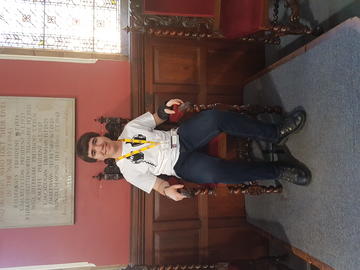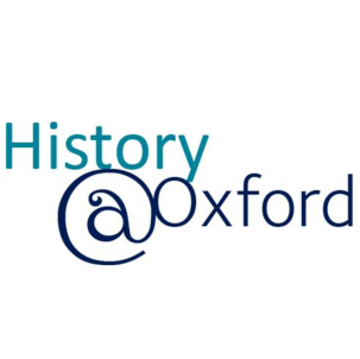Reflecting on my UNIQ experience
I had an incredible experience which ultimately led me to where I am today

Daniel is a second year BA History and Politics student at Magdalen College. He is a disabled student and the first in his immediate family to go to university. Daniel is Magdalen’s JCR President and an Elected Member of Standing Committee at the Oxford Union. He is also a Trustee of Potential Plus UK, a Founding Ambassador and Expert Panel Member for Zero Gravity, a Sutton Trust Alumni Leadership Board Member and a History Faculty Ambassador. Before coming to university, Daniel studied at a non-selective state school, and was a participant on the UNIQ, Sutton Trust, and Social Mobility Foundation APP Reach programmes, as well as being part of the inaugural Opportunity Oxford cohort. Daniel is passionate about outreach and social mobility and ensuring all students have the best opportunity to succeed.
UNIQ was one of the best weeks of my life – fun, action packed, and incredibly interesting. I would highly recommend this course to any student who is eligible, as in my case it changed my university plans entirely and made me want to come to study at the University of Oxford. This blog will outline my experience of UNIQ in 2019, reflecting on the value of the experience and giving you an idea of what you could potentially expect from such a scheme.
It is worth briefly acknowledging there have been changes to the structure of UNIQ since I was on the programme – due to coronavirus, UNIQ went online for 2020 and 2021. The current plan for 2022 is that online content will take place from Easter, with a one week in-person component in the summer. When I did UNIQ, I visited Brasenose College for one week in July 2019 for the History: Race and Protest course.
The whole aim of UNIQ is to give you an understanding of what it is like to study at university. The days started off with a lecture given by some of the same academics who have later taught me, followed by a discussion group led by a postgraduate student. The lectures were useful for developing notetaking skills and getting a general understanding of the topic, while the discussion groups allowed us to reflect in small groups (around 10 students) about what we had heard as well as wider themes which linked to the course. Academically I think the discussion groups were a real highlight because it really drew out the nuance and detail of the lectures, and it was great to also learn about the experiences of other participants and to hear their differing perspectives.
In the afternoons, we would also have another lecture and potentially another discussion group, or we would be allocated time to study in one of Oxford’s libraries to read some of the material discussed in the lectures. At the end of the programme, we had to submit an essay on an open-ended question set by the lead academic, drawing on any material that we wanted to from what we had heard or read about. While I was initially concerned about the essay, the academics explained it was only in place to share our thoughts and our interests from the programme. It was not formally assessed which really took the pressure off, and we only spent a few hours on it in total so it felt much more relaxed than an exam and was as much for us as the tutorial.
Tutorials are what differentiate Oxford’s teaching – this is where a very small group of students spend usually an hour or so with an academic, talking about an essay as well as broader questions which were linked to the topic. There were around two people in every tutorial group for the programme, and while studying at Oxford I have found tutorials to usually contain between one and three people. The tutorial was a great way to close the academic programme for the week, reflecting on my take on the content as well as challenging me to think about the content in different ways.
My standout academic experience from the week was getting to hear a lecture from Professor Stephen Tuck on Malcolm X’s address to the Oxford Union in the historic debating chamber, and is a lecture I don’t think I will ever forget. It was inspiring to hear something so thought-provoking in such an interesting setting, and it also gave a small insight into some of the student societies on offer in the city.
The academic programme ran from 9am-5pm and I found it to give a great indication of what it is like to be an undergraduate, though I believe the benefits of UNIQ to be far more wide-reaching. From eating in college dining halls to seeing what shops and local food takeaway places there are to getting to meet other people from similar backgrounds, the programme was all-encompassing and incredibly helpful. I continue to stay in touch with some of those who I met on UNIQ, and I think creating those networks makes the application process seem less daunting. That shared social experience of the programme should not be undervalued, particularly with social events taking place throughout the week like games nights and a disco.
The UNIQ programme equipped me with some really helpful skills for applying to Oxford. Every night we would have an application workshop, looking in-depth at each part of the process from how to construct a personal statement and personalised feedback on drafts to talking through a practice admissions assessment together. These workshops really cleared up the process, and meant I was confident in what to do when it came around to the real thing. Also, having spent a week considering an academic topic in-depth it gave me something to talk about in my personal statement, and gave me pointers for where I could read further to show my passion for the subject.
The programme coordinators were really supportive of my accessibility requirements, and went above and beyond to ensure I could access all the course material. At the time I had not been formally diagnosed with a disability but I was not able to write due to crippling arm pains, so I requested to be allowed to use my own laptop in lectures and teaching sessions to ensure I could still make notes. When I arrived, I was greeted with a University provided laptop, time was spent to ensure it was all working correctly and suitable for my needs, and I was checked in with throughout the week so that I knew I could raise any queries. It may have been a small adjustment, however it massively improved my experience and made Oxford feel all the more welcoming and inclusive. This was only added to by the course being entirely free from start to finish with all travel and food provided by the programme.
UNIQ genuinely changed my life; I had written off Oxford as a place that wasn’t for people like me but I couldn’t have been more wrong. The ability to be there, to see myself thriving in that environment and the support provided throughout the programme meant I had an incredible experience which ultimately led me to where I am today. I am forever thankful for the opportunity I was given, and it has been a privilege to become an ambassador for the programme in 2021 where I got to give back for all the support I received.




